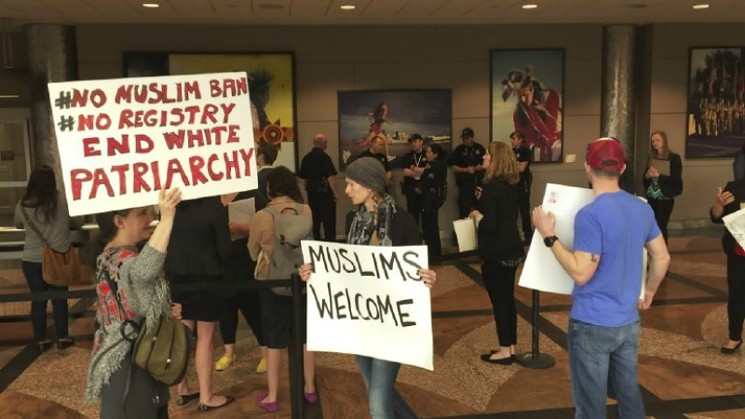The Ahmed sisters loved going to see Marvel movies together. Zara and Leyla always sat at the back of the theater, just in front of the projector.
On July 20, 2012, their preference for sitting so far from the screen turned out to be a livesaver. Just minutes into the premiere of The Dark Knight Rises, a gunman walked into the Century 16 movie theater in Aurora and unleashed a shower of bullets. Zara was grazed by one, but she and Leyla still managed to crawl out of their row and sneak out through the exit while James Holmes was dealing with a jammed gun.
Both naturalized U.S. citizens living in Aurora, Zara and Leyla had been brought by their family to America in 1998 to flee violence in Somalia. But in a tragic twist of fate, the worst violence they had ever faced was not in their war-torn homeland of Somalia, but in an Aurora movie theater six years ago today.
And their problems have only compounded with time. Zara feels that members of her community are now being treated as second-class citizens simply because of their national origin.
President Donald Trump's travel ban, upheld five to four by the U.S. Supreme Court on June 26, prevents immigrants from five Muslim-majority countries from obtaining visas. North Korea and Venezuela are also included in the ban, but the clear majority of those who will be affected hail from Iran, Libya, Syria, Yemen and Somalia.
The travel ban has already affected the Ahmed family.
The sisters' uncle lives in Somalia and wants to move to either Boston or Colorado to find work and a safe living environment, but hasn't tried to apply for a visa because he knows he won't get it. “We haven’t even bothered to start the process," Zara says. "What we understand is that no one from Somalia can come.”
After the shooting, Zara returned to school at the University of Colorado Denver. Her speech class that semester met in a large auditorium, which took her back to that night in July. “It was hell going through that class. I kept having flashbacks,” Zara says. But she made it through, knowing that she needed to pass in order to get her degree.
“As an immigrant, you just push through everything,” she explains. But pushing through everything hasn’t always been easy.
In 2011, members of Al-Shabaab, an Al-Qaeda affiliate in Somalia, visited a relative of the Ahmeds who lived in Mogadishu, where he owned a store. True to its reputation for spreading terror in the east African nation, the group presented him with an ultimatum: Pay us a cut of your profits or we’ll kill you.
The man thought it was an empty threat, since the group was also well known for not following through. He refused to pay them. Days later, he was shot dead in his own store.
Such a horrific event is all too familiar for Somalians. The country, torn apart by a civil war since the late ’80s, is a failed state with a weak central government. Nearly 4,500 Somali refugees were resettled in Colorado between 1980 and 2016. Those individuals have started families, and the number of Somalis living in the state has grown. So has hostility to immigrants.
Zara says that in all the years she's been in the U.S., she's never experienced the level of anti-immigrant sentiment she finds today. “I just feel like it’s a lot worse. It’s unfortunate, because these people don’t know how hard it is to be an immigrant,” she says.
Given the current political climate, she believes the U.S. is headed in a dangerous direction. “Coming from a war-torn country, this is how civil wars happen," she says.
In addition to implementing the travel ban, the Trump administration is also instituting stricter vetting procedures for refugees and their family members who wish to come into the U.S. In the past, family reunification cases could take up to two years. Now, some cases are still pending after three or four years, says Atim Otii, an immigration attorney in Denver.
Farah Zamzam fled Somalia in 1991 and landed in a refugee camp in Kenya. In 2007, she was resettled as a refugee in Seattle. A year later, she moved to Colorado, where she now works in a meat factory. Zamzam's three children live with her late husband’s family in Kenya, and she has spent years trying to bring them to the U.S. She first had to prove that her children were, in fact, her blood relatives. Once that was done, she began the visa process in 2016. But since the travel ban, she has not heard back from State Department officials.
“There have been a lot of delays. I’ve paid so much for bloodwork and lawyers. I’m a taxpayer. I work. It’s unfair,” she says, adding that she has trouble sleeping at night, not knowing if her kids will continue to live safely because of constant bombings where they live.
"I share the same type of frustrations that a lot of the Somali community has, because we are seeing an extreme delay in family reunification," Otii says. "We don't have a clear sense of how U.S. Citizenship and Immigration Services is processing family-reunification cases both here in the United States and overseas."
[
{
"name": "Air - MediumRectangle - Inline Content - Mobile Display Size",
"component": "12017618",
"insertPoint": "2",
"requiredCountToDisplay": "2"
},{
"name": "Editor Picks",
"component": "17242653",
"insertPoint": "4",
"requiredCountToDisplay": "1"
},{
"name": "Inline Links",
"component": "18838239",
"insertPoint": "8th",
"startingPoint": 8,
"requiredCountToDisplay": "7",
"maxInsertions": 25
},{
"name": "Air - MediumRectangle - Combo - Inline Content",
"component": "17261320",
"insertPoint": "8th",
"startingPoint": 8,
"requiredCountToDisplay": "7",
"maxInsertions": 25
},{
"name": "Inline Links",
"component": "18838239",
"insertPoint": "8th",
"startingPoint": 12,
"requiredCountToDisplay": "11",
"maxInsertions": 25
},{
"name": "Air - Leaderboard Tower - Combo - Inline Content",
"component": "17261321",
"insertPoint": "8th",
"startingPoint": 12,
"requiredCountToDisplay": "11",
"maxInsertions": 25
}
]














